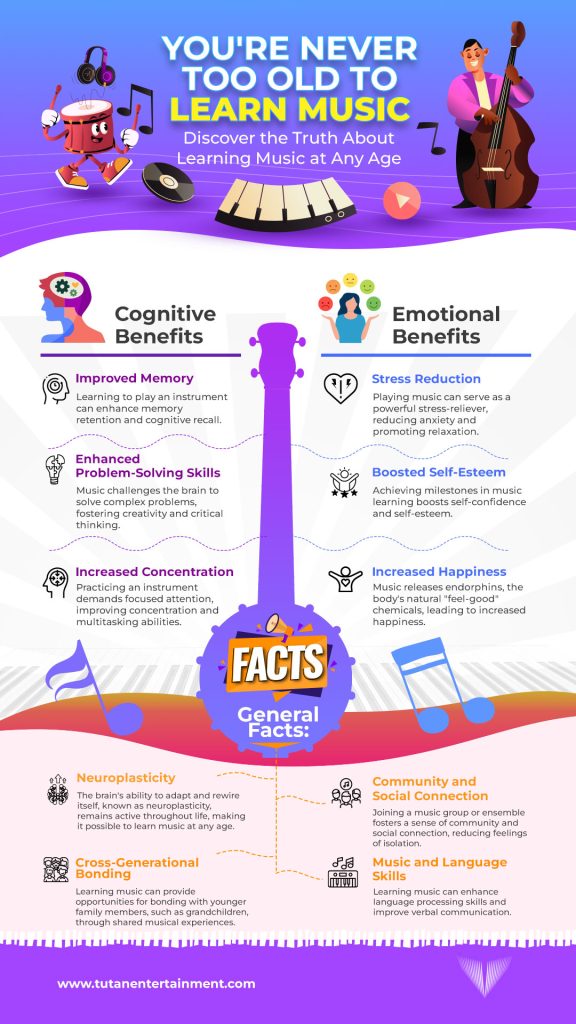Music is often described as a universal language that transcends boundaries, communicates emotions, and connects people from all walks of life. However, despite its undeniable allure, many individuals hesitate to pursue their musical aspirations because they believe they are too old to start learning. The truth is, age is just a number when it comes to music, and embarking on a musical journey later in life can be a profoundly rewarding experience. In this article, we’ll debunk the myth that you’re too old to learn music and explore the cognitive and emotional benefits that music offers, regardless of your age.
Breaking the Age Barrier
The notion that you must be a prodigy or start learning an instrument at a young age to become a musician is a common misconception. In reality, many individuals have embarked on their musical journeys later in life and achieved remarkable success. Consider the story of Jane, who started learning the piano at the age of 68. She once believed she was “too old,” but she quickly discovered that age was not a barrier to her musical aspirations. Jane’s journey is a testament to the fact that it’s never too late to embrace music.
Cognitive Benefits of Learning Music
Learning music offers a plethora of cognitive advantages that extend to individuals of all ages. Research has shown that it can:
Enhance Memory: Playing an instrument improves memory retention and cognitive recall. The mental effort required to learn and practice music strengthens your memory muscles.
Boost Problem-Solving Skills: Music challenges your brain to solve complex problems, fostering creativity and critical thinking. This benefit can have a positive impact on your daily life.
Increase Concentration: Practising an instrument demands focused attention, which can improve your ability to concentrate on tasks and multitask effectively.
Emotional Benefits of Learning Music
The emotional benefits of learning music are equally compelling:
Stress Reduction: Music serves as a powerful stress-reliever, reducing anxiety and promoting relaxation. It can be your refuge during challenging times.
Boosted Self-Esteem: Achieving milestones in music learning boosts self-confidence and self-esteem. The sense of accomplishment from mastering a new piece is immeasurable.
Increased Happiness: Music releases endorphins, the body’s natural “feel-good” chemicals, leading to increased happiness. Playing an instrument or singing can bring joy and fulfilment.
General Facts to Consider
Neuroplasticity: The brain’s ability to adapt and rewire itself, known as neuroplasticity, remains active throughout life, making it possible to learn music at any age.
Music and Language Skills: Learning music can enhance language processing skills and improve verbal communication.
Community and Social Connection: Joining a music group or ensemble fosters a sense of community and social connection, reducing feelings of isolation.
Cross-Generational Bonding: Learning music can provide opportunities for bonding with younger family members, such as grandchildren, through shared musical experiences.

Getting Started on Your Musical Journey
If you’ve been inspired to embrace music, regardless of your age, here are some practical pointers to help you get started:
1. Choose an Instrument or Genre that Speaks to You:
Explore different instruments and music genres to find what resonates with your interests and personality. Whether it’s the acoustic guitar, piano, or even your own voice in singing, pick what excites you the most.
2. Find a Knowledgeable Teacher or Online Resources:
Consider taking lessons from a qualified music teacher who can guide you through the basics and help you progress. Alternatively, there are plenty of online tutorials, courses, and apps available for self-learners.
3. Set Realistic Goals:
Start with achievable goals that align with your skill level. For example, your first goal could be mastering basic chords or scales. As you progress, you can set more ambitious milestones.
4. Dedicate Time to Practise:
Consistency is key in learning music. Set aside regular practice sessions, even if they’re short, to build muscle memory and improve your skills over time.
5. Join a Music Community:
Connect with other musicians, whether through local music groups, online forums, or social media communities. Sharing your musical journey with others can be motivating and rewarding.
6. Embrace Music Theory:
While not mandatory, learning some music theory can deepen your understanding and appreciation of music. It can also help you communicate with other musicians and compose your own music.
7. Be Patient and Kind to Yourself:
Remember that learning an instrument or pursuing music can be challenging at times. Don’t be too hard on yourself when you make mistakes; they are a natural part of the learning process.
8. Explore Performance Opportunities:
Once you feel confident, consider participating in open mic nights, joining local ensembles, or sharing your music with friends and family. Performing can be a rewarding aspect of your musical journey.
9. Keep the Passion Alive:
Most importantly, maintain your love and passion for music. It’s what will drive you to continue learning and improving, regardless of your age.
10. Stay Curious and Keep Learning:
Music is an ever-evolving art form. Stay curious, keep exploring new genres, techniques, and instruments. Your musical journey is a lifelong adventure filled with endless possibilities.
Conclusion:
In the end, age should never deter you from pursuing your passion for music. The journey of learning music is not defined by when you start but by your dedication, enthusiasm, and love for the art form. Whether you’re picking up an instrument for the first time or rekindling an old musical flame, remember that the melodies of life are waiting for you to unlock. So go ahead, embrace the beauty of music, and discover the countless joys it can bring, regardless of your age.
It’s never too late to start your musical journey. Take that first step, and you’ll be amazed at the world of music that awaits you.



